Shopify vs BigCommerce: Which Is The Better Platform In 2026?

When it comes to building an online store, Shopify and BigCommerce are “top-of-mind” options for business owners worldwide.
Among the over 200 eCommerce platforms out there, Shopify and BigCommerce stand out as giants with their robust features, revolutionizing the way you sell products and services online.
The point is: while the two seem similar on the surface, how can you know which one is your best partner?
Choosing the right platform to kickstart your online business is crucial to your success. To save you huge time and effort on evaluating each, we’ve unpacked their functions and features side by side, then headed to an all-encompassing Shopify vs BigCommerce comparison. This article will help you arrive at your own choice for your perfect platform.
BigCommerce vs Shopify: At a Glance
What is Shopify?
Shopify is an all-in-one eCommerce platform that lets you create and manage your own online store. No need for technical expertise! The platform packs all the essential features you need to grow and expand your business, including frontstore design, sales and marketing, payment, shipping, and more.
Shopify is well-known for its user-friendly interface and straight-forward store building process, making it a top choice for eCommerce newcomers.
Additionally, it stands out with vast third-party apps and integration options and a huge user community around the globe.
Learn more: Shopify Tutorial: How to Set Up A Shopify Store from Scratch for Beginners
What is BigCommerce?
BigCommerce is a powerful eCommerce platform that provides you with comprehensive control over your online store, covering setting up, selling, managing product inventory, marketing, etc.
Like Shopify, BigCommerce is an easy to use and versatile solution for nontechies. This eCommerce platform stands out among other competitors with its powerful and comprehensive toolset, which gives your online store more advanced functionality and meets diverse business requirements.
Side-by-side Comparison
Before delving into a detailed exploration of Shopify vs BigCommerce, let’s warm up the game by taking a quick look at a side-by-side comparison table.
|
Shopify |
BigCommerce |
|
|
All-in-one platform |
Yes |
Yes |
|
Unlimited products |
Yes |
Yes |
|
Customization |
Yes |
Yes |
|
Customer support |
24/7 |
24/7 |
|
Third-party apps/ integrations |
Yes |
Yes |
|
Starting price |
$25 per month |
$39 per month |

BigCommerce vs Shopify: Feature breakdown
Shopify vs BigCommerce seems to be a never-ending battle, as the two boast the same powerful features dedicated to the eCommerce community, especially newcomers. We conducted a comparative test by creating an online store from scratch on both platforms. There are some noteworthy differences we uncover that may help you in your search for a suitable match.
Selling features
Selling capability is definitely the first and foremost thing that every online business owner is looking for in an eCommerce platform.
A quick glance at the two control panels may give you some insights into their selling support.
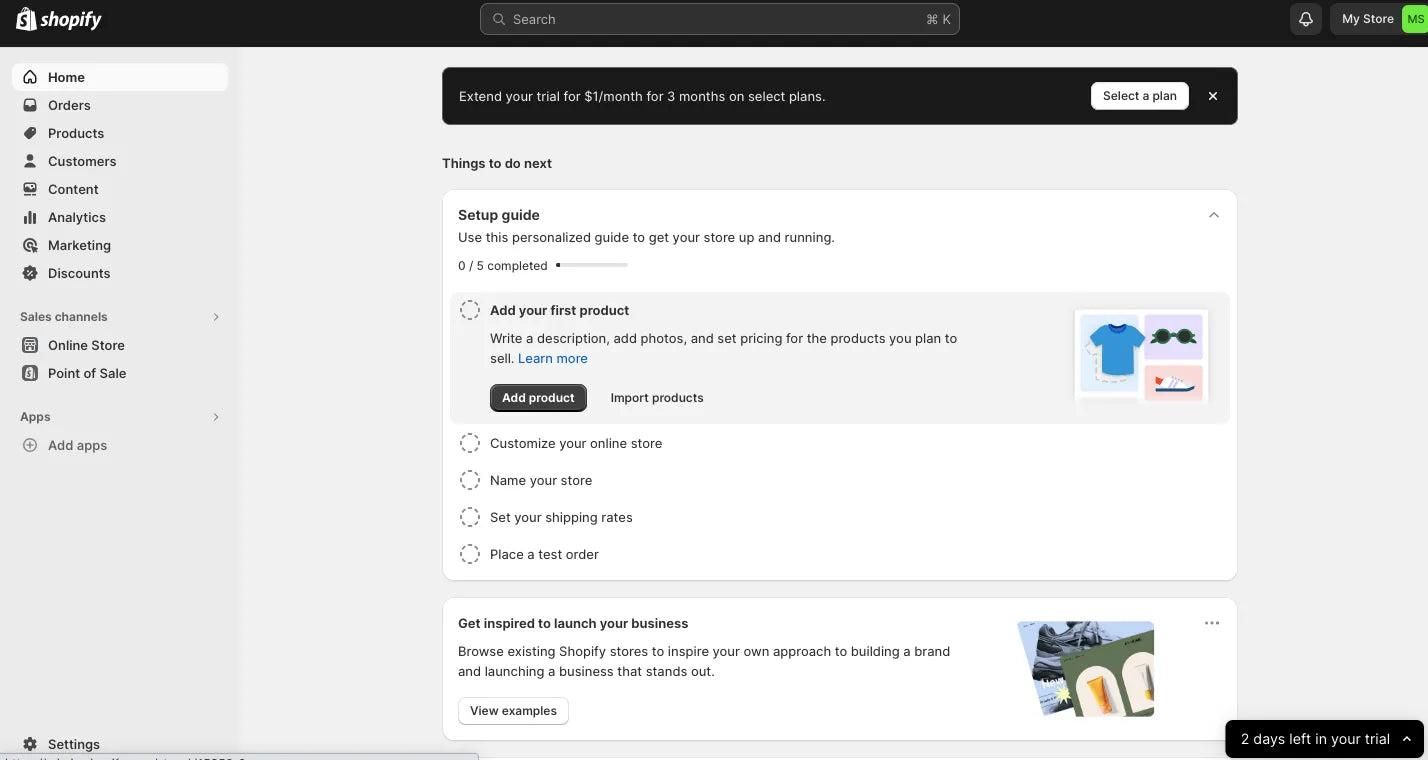
After successfully logged in, you will immediately navigate to the Shopify dashboard.
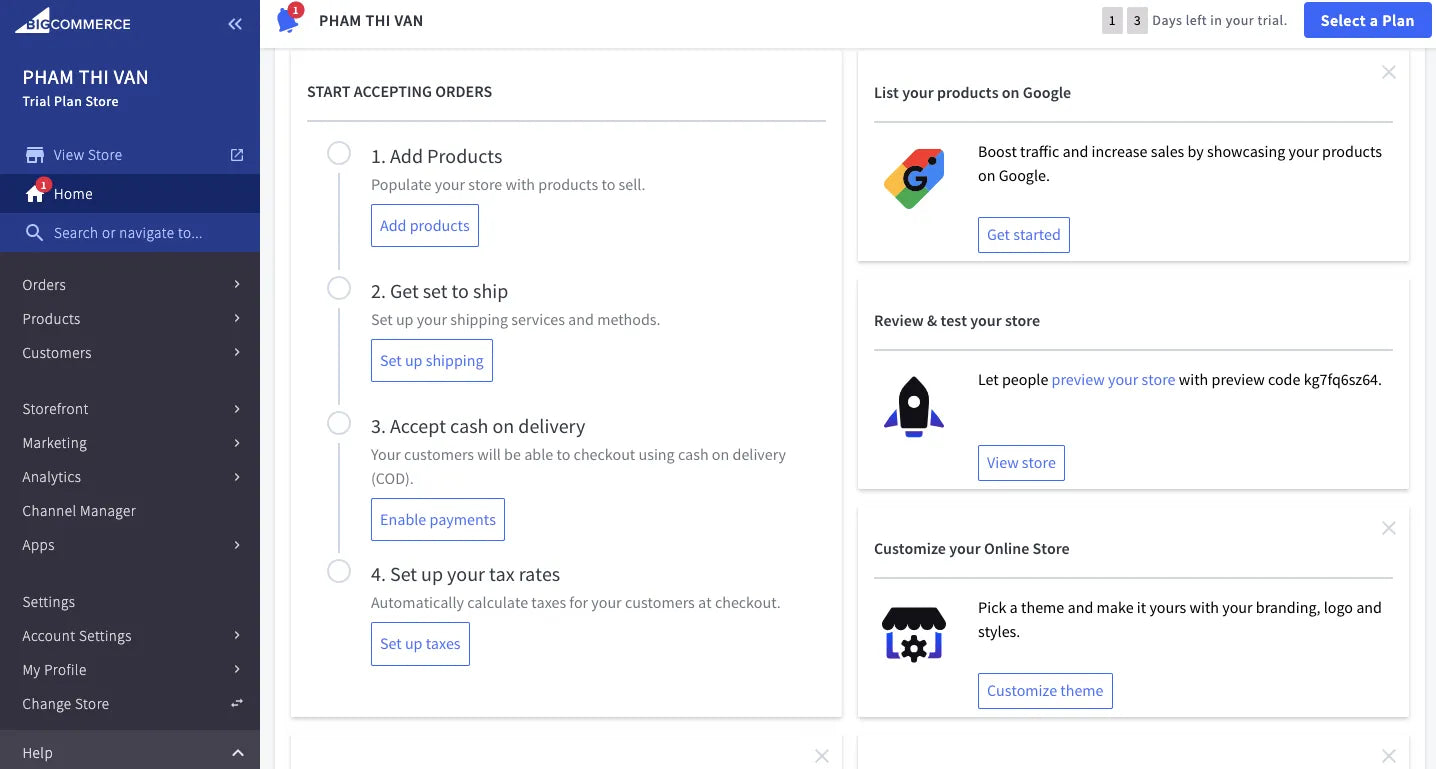
BigCommerce dashboard gives a clear guide on how to build your online store from scratch.
At a glance, the two platforms offer you a wealth of essential built-in features, covering all aspects of selling.
There are slight differences that might be deciding factors for you to choose the right one.
Firstly, BigCommerce has the edge in offering comprehensive control over a more diverse and larger product portfolio. The numbers below will shed light on this point.
|
Shopify |
BigCommerce |
|
|
The number of staff accounts |
Up to 15 |
Unlimited (with any plans) |
|
Number of Variants |
100 |
600 |
|
Product filtering capability |
Not have faceted search as a built-in feature, but rather collection-based filtering based on basic criteria. However, there are various third-party apps in the Shopify App Store that offer more advanced filtering functionality. |
Offer a built-in faceted search, allowing you to create more customizable filter options. |
With unlimited staff accounts, more variants, and an advanced product filter system, BigCommerce would be a wise choice if you are selling specialized products with a variety of types and variants.
However, if your business is growing and expanding, Shopify would satisfy you better.
Let’s break this down.
Shopify’s app store (with over 8,000 apps) is more extensive than BigCommerce’s (with more than 1,300 apps), making it easier to incorporate any apps into your online store. Your business would be more easily customizable and empowered, with more functionality needed for its growth and expansion.
Also, Shopify is more versatile in terms of market expansion than BigCommerce.
The comparison below explains why:
|
|
Shopify |
BigCommerce |
|
Multi-frontstore limit (Which enables you to manage different stores in one dashboard.) |
Up to 10 |
Up to 8 |
|
Sales limit |
No sales limit |
Standard sales limit: $50,000 Plus: $180,000 Pro: $400,000 |
|
Built-in POS Feature |
Yes |
No |
|
Payment gateway options |
+100 |
+65 |
With diverse payment options and sales volume, Shopify wins this round. It should be highlighted that the POS is an excellent tool to effortlessly integrate your Shopify store with a brick-and-mortar shop, which is not a built-in feature in BigCommerce.
Learn more: Shopify Features and Benefits — a Detailed Overview
Pricing and Costs
Let’s put the two platforms’ pricing plans on the table.
|
|
Shopify |
BigCommerce |
|
Free trial |
3 days then 1$ for the next 3 months |
15 days |
|
Subscription monthly plan |
25$-399$ Basic (25$) Shopify (65$) Advanced (399$) Business package (customized) |
39$ - 399$ Standard ($39/month) Plus ($105/month) Pro ($399/month) Enterprise plan (depending on requirements) |
|
Subscription yearly plan |
Basic (19$) Shopify (49$) Advanced (299$) |
Standard (29$) Plus (79$) Pro (299$) |
|
Discounted plans |
25% on annual plan |
25% on annual plan |
Both platforms offer three tiers of pricing structures, along with custom plans tailored for enterprises.
At a glance, Shopify clearly has the pricing advantage. The difference, however, is what you get instead of actual prices.
Let’s talk about Shopify pros. The platform has no sales limits and abandoned cart saver on all of its plans. However, it limits the number of staff accounts and charges you transaction fees for non-Shopify payments.
There is no transaction fee on any of BigCommerce’s plans. However, its abandoned cart saver only applies to higher plans, including Plus, Pro, and Enterprise plans.
It’s not easy to vote on which is the winner in terms of cost, as it depends on your business's demands. Keep reading as we continue to stack up some crucial factors for you to decide where to invest your money best.
Ease of Use
Both platforms are well-known for their simplicity, user-friendly dashboards, and intuitive processes. You can set up your own online store with full eCommerce functionalities in a blink.
However, if you are new to the eCommerce world, BigCommerce could be overwhelming at first due to its massive and wide scope interface, as well as several technical terms you may encounter during the building process.
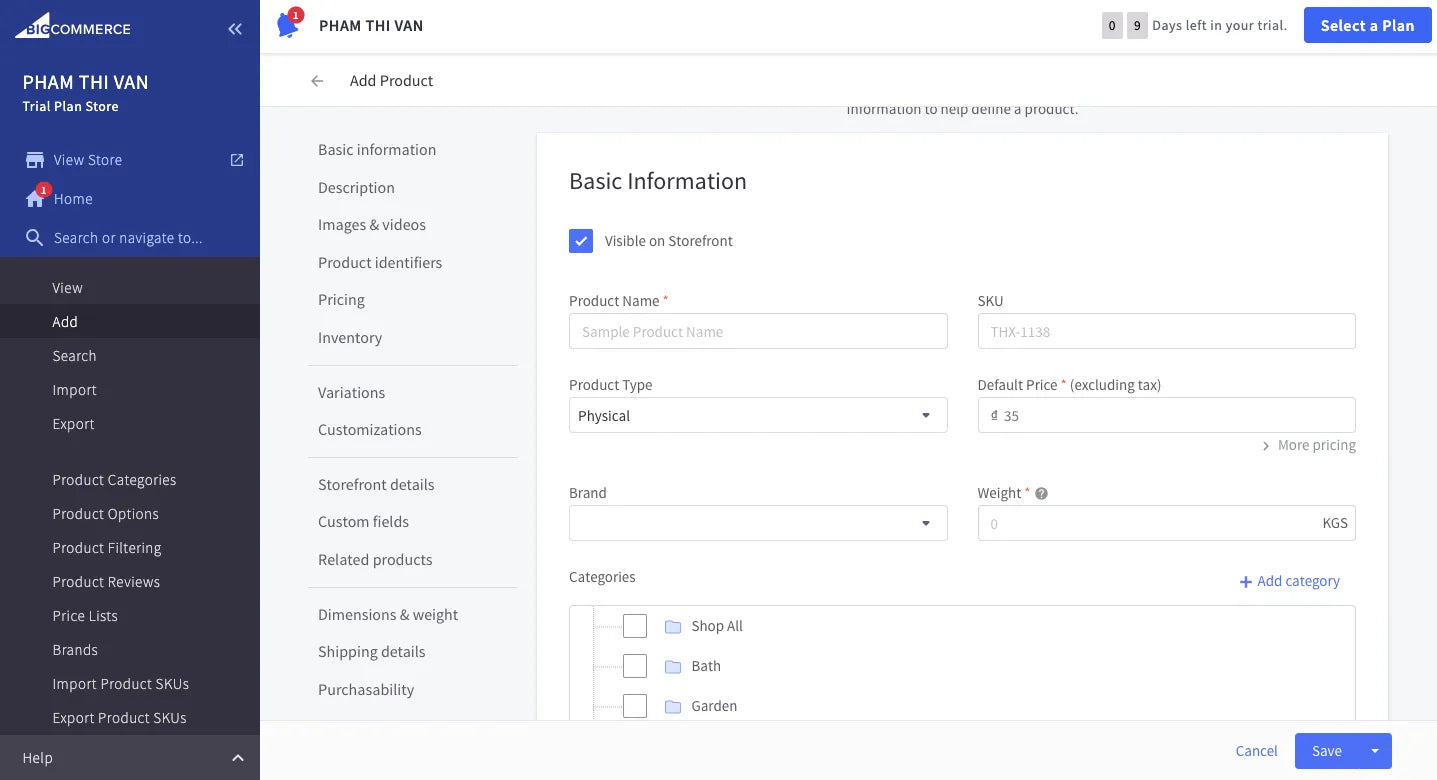
The BigCommerce’s dashboard could be overwhelming for new users.
Shopify, on the other hand, is easy to follow and can be quickly learned. Its straightforward flow seamlessly guides you through every stage of the building process.
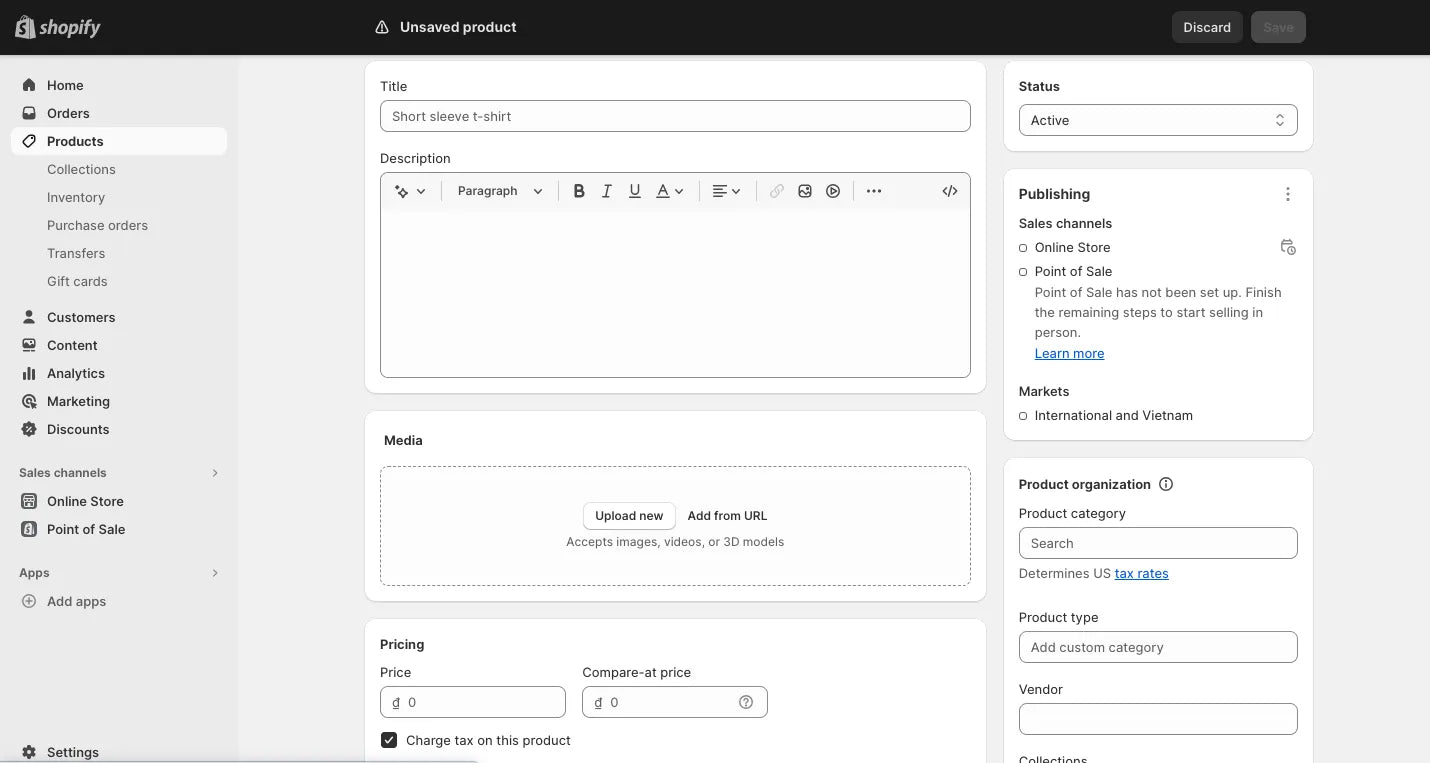
Shopify offers a straight-forward and simple guide on adding new products.

Design and Customization
Overall, the two user-friendly dashboards offer a straightforward and streamlined building process. All the essential features, from creating an online store to managing inventory and other marketing tasks, can be easily done on intuitive control panels.
However, BigCommerce has fewer theme options compared to Shopify and is more difficult to edit. The platform also requires more technical knowledge and coding skills to modify the code if you want to customize the frontstore.
Shopify, on the other hand, offers a larger variety of theme options that suit various industries. Its sleek and simple editor can provide a streamlined and enjoyable experience when creating an online shop.
Moreover, Shopify supports 3D models and AR on product pages, which is a nice win.
It is worth mentioning that BigCommerce has a drag-and-drop dashboard, which is not available on Shopify.
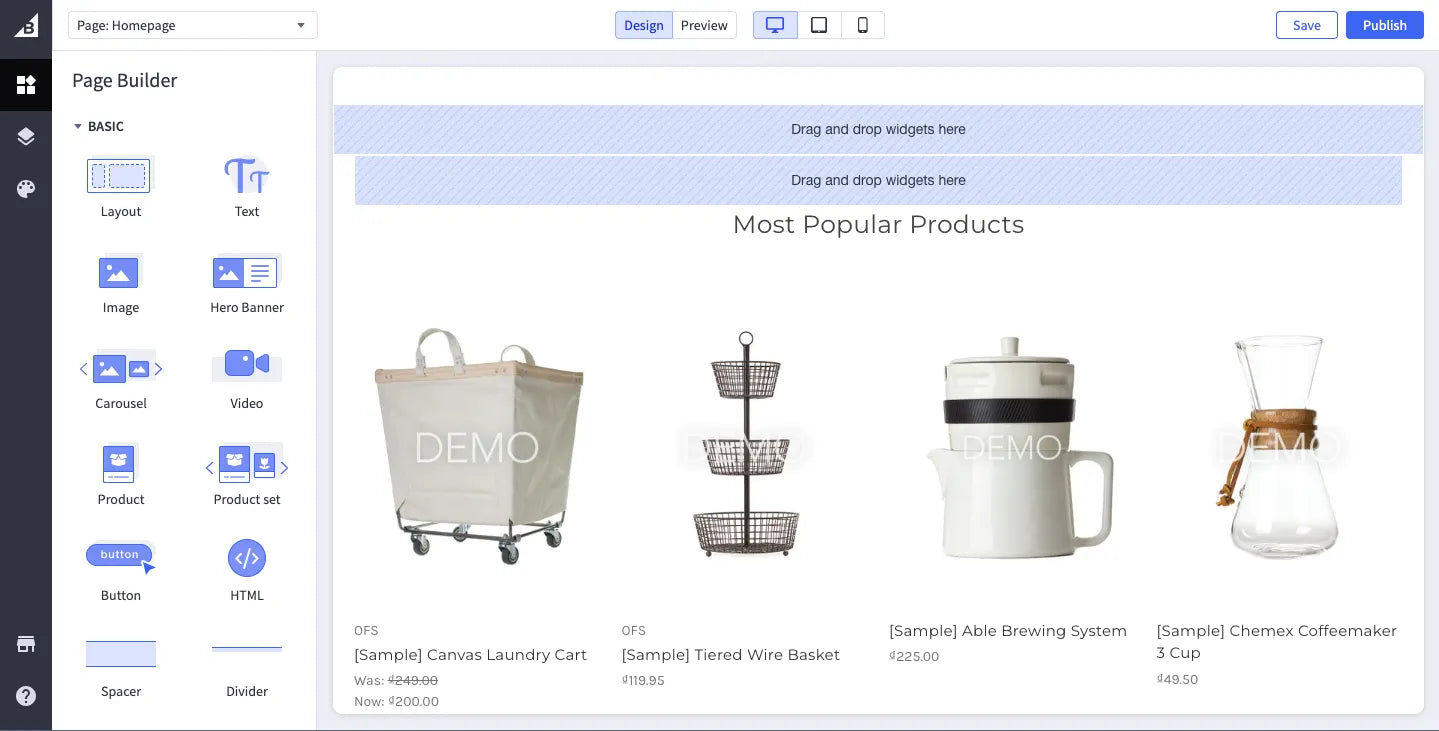
That said, it makes no difference, as the massive Shopify apps and integrations will allow you to seamlessly integrate drag and drop editors and customize your frontstore.
It takes just a few minutes to integrate your Shopify online shop with a third-party app page builder like GemPages. You will immediately have access to a drag-and-drop interface and a wide selection of high converting pre-made GemPages themes. The designing process will be even faster and more enjoyable with the support of GemPages’ AI image-to-layout feature.
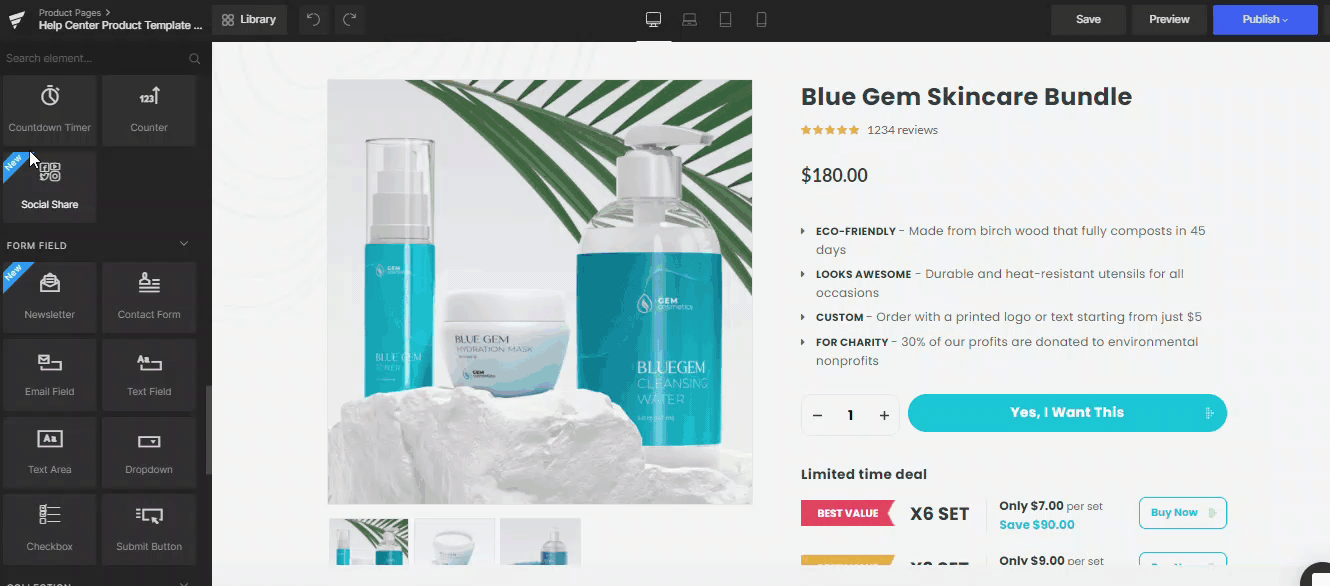

SEO Performance and Marketing Tools
Both Shopify and BigCommerce offer the robust built-in marketing tools and SEO basics you need to increase revenue. Also, you can effortlessly integrate other marketing third-party apps to optimize marketing performance for your online business.
An advantageous feature of Shopify is its built-in email marketing system, which supports you during marketing flows, including onboarding, purchase, upsells, abandoned cart reminders, and more.
BigCommerce doesn’t include email marketing as a built-in feature. However, it seamlessly integrates with popular marketing tools like Mailchimp, Google Ads, Constant Contact, Omnisend, Facebook Ads, etc….
One feature that sets BigCommerce apart is that the platform enables Google customer reviews, which is beneficial to enhance credibility and trust.
Learn more: How to Create and Manage Multiple Shopify Stores?
BigCommerce vs Shopify: The pros and cons
These comprehensive comparisons between BigCommerce and Shopify lead to a summary of the two’s pros and cons, as highlighted below:
|
Shopify |
BigCommerce |
|
|
Pros |
|
|
|
Cons |
|
|
Bottom line
All the criteria that we break down one-by-one in the Shopify vs BigCommerce faceoff may be helpful guides for you to pick the one to go with.
If you are an online store handling complex and extensive inventory, BigCommerce might be a good fit for you.
For an eCommerce newcomer seeking a streamlined flow for building and managing stores, we recommend Shopify due to its ease of use. And don’t forget to utilize other third-party apps like page builders to get the most out of your eCommerce platform and make your online store stand out from the crowd.




 Facebook Community
Facebook Community Change Log
Change Log Help Center
Help Center










